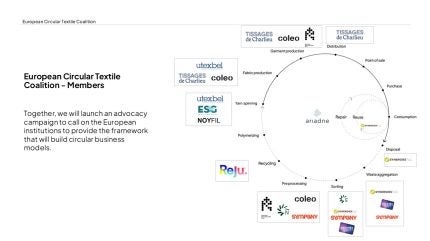
Reju, along with Resortecs, COLEO, Tissage de Charlieu, Synergies TLC, Nouvelles Fibres Textiles, Sympany, European Spinning Group, Ariadne, Erdotex, Utexbel, and Noyfil, have launched the European Circular Textile Coalition to promote a fully circular textile economy across Europe.
The group’s manifesto calls on the EU to transform post-consumer textile waste into a driver of green jobs, innovation, and competitiveness, arguing that Europe’s current waste model is unsustainable. The continent produces 12.6 million tonnes of textile waste annually, with most ending up in landfills, incinerators, or exported, and only 1% recycled back into new garments.

Discover B2B Marketing That Performs
Combine business intelligence and editorial excellence to reach engaged professionals across 36 leading media platforms.
“We refuse to accept textile waste as an inevitability; we see it as a solvable challenge for our generation,” the manifesto states.
The coalition urges the EU to match its regulatory ambition with investment in textile recycling and manufacturing infrastructure. “Without system readiness, even the most forward-looking regulations risk falling short. We are here to help bridge that gap,” the group said.
To drive change, the manifesto outlines three core policy pillars:
- Ensure a competitive European textile chain, bringing production back to European shores to uphold environmental and labour standards.
- Prioritise high-quality textile-to-textile recycling, making post-consumer textile waste the main feedstock for new textiles.
- Set mandatory recycled content in textiles, with ambitious, but realistic targets phased in over time.
Reju CEO Patrik Frisk emphasised that collaboration is key to driving systemic change.

US Tariffs are shifting - will you react or anticipate?
Don’t let policy changes catch you off guard. Stay proactive with real-time data and expert analysis.
By GlobalDataHe said: “Reju is a system change company, and we strongly believe that change happens with collaboration. That is why this coalition is important to drive change collectively as an industry, pulling together, and we welcome more businesses to join us.”
The coalition argues that voluntary efforts have proven insufficient, and binding EU standards are now needed to stimulate demand for recycled materials. It is launching an advocacy tour to engage policymakers and industry stakeholders across Europe.
“Now is the time to act – because when a world without waste is possible, we cannot afford to wait,” the manifesto concludes.





